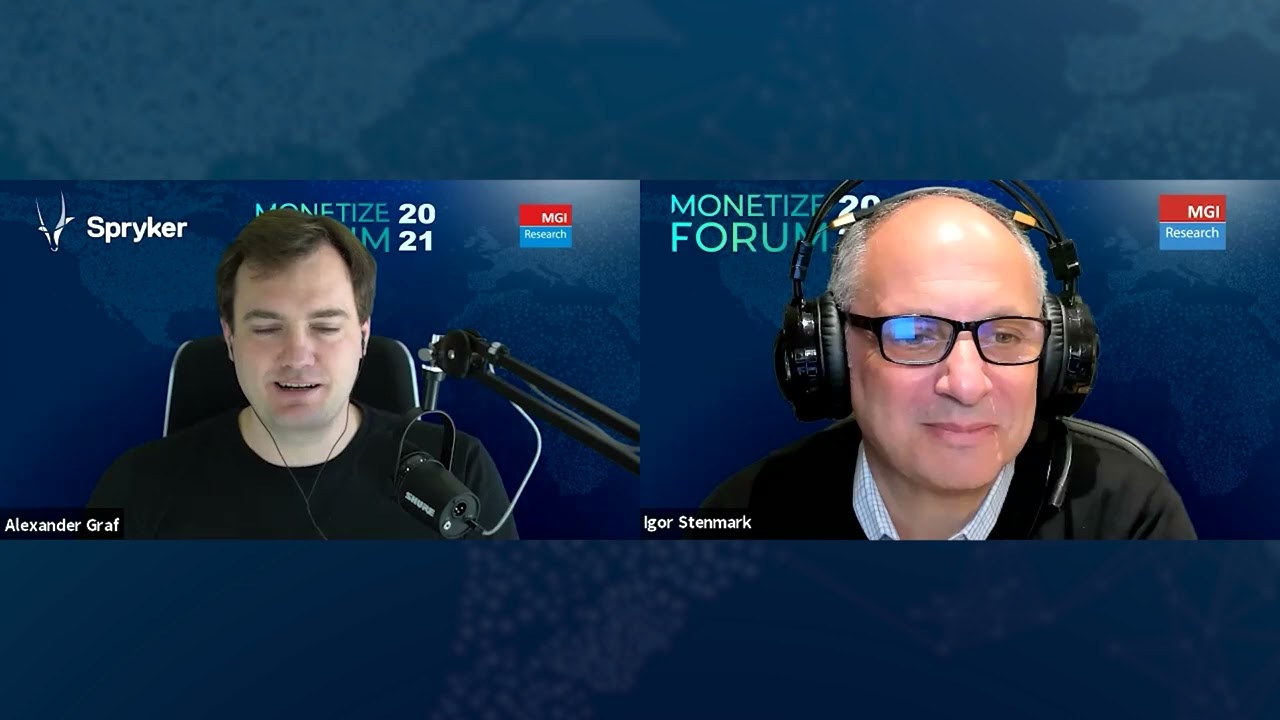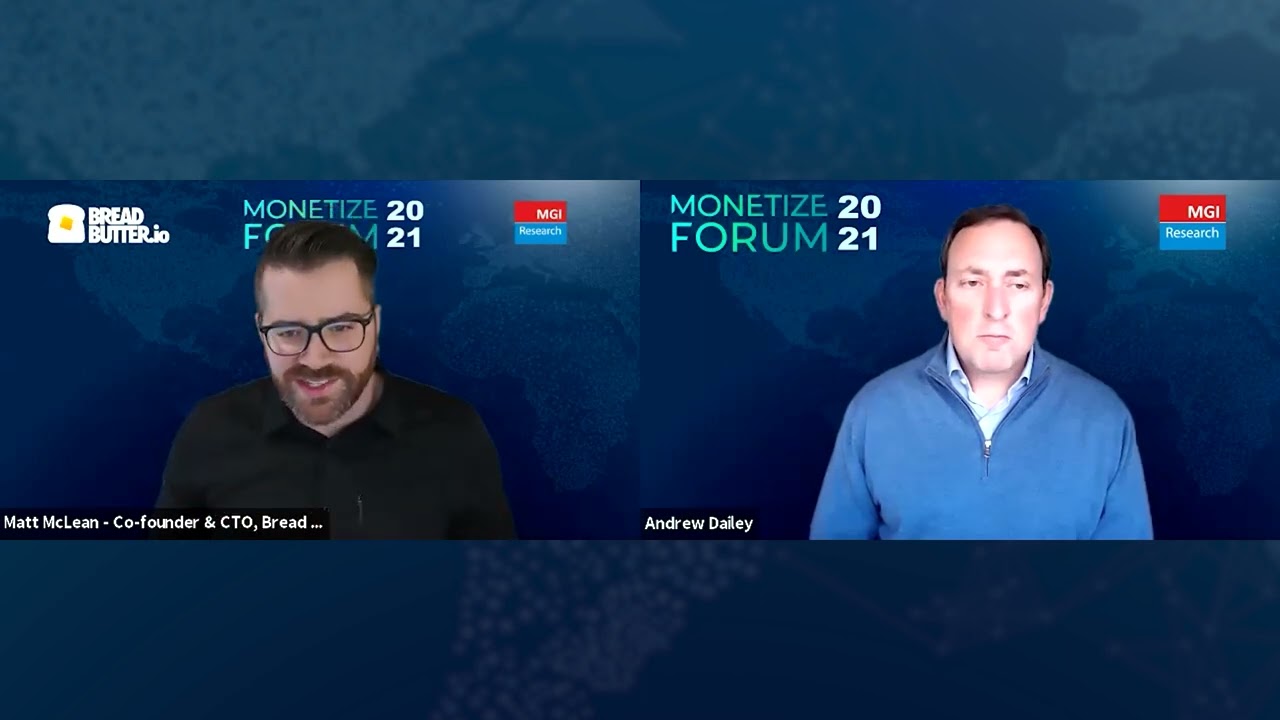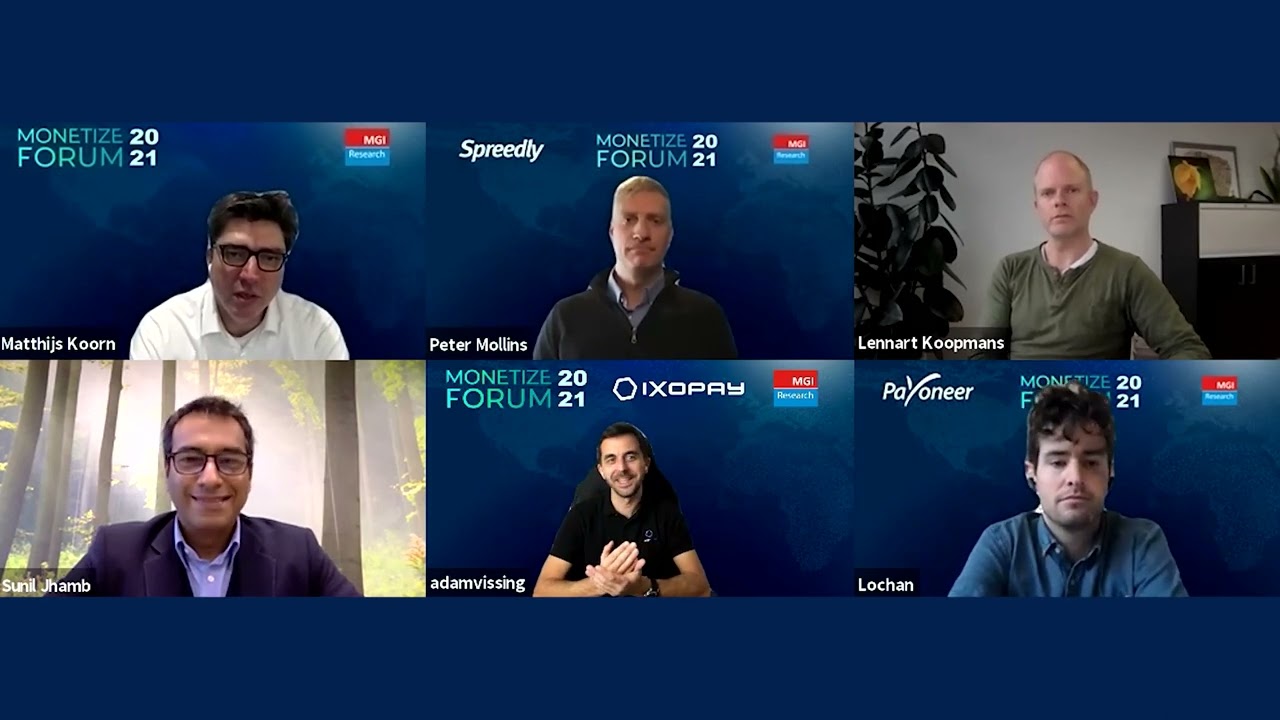
2020 spurred massive disruption in established beliefs around where technology businesses should set up shop. With most employees working from home, companies are reassessing the rent they’re paying for offices in the Bay Area and other traditional tech hubs. At the same time, they still understand the importance of being in close proximity to resources and a strong industry ecosystem, and it’s expected that we’ll return to some version of the office once it’s safe to do so. These are some of the reasons why metro Atlanta is gaining traction with businesses domestically and internationally and why we chose to highlight it at the 2021 Monetize Forum, where MGI Research associate Jennifer Holcombe spoke with Grant Wainscott of the Metro Atlanta Chamber of Commerce and Kristina Morris of FinTech Atlanta.
Key Issues
How can chambers of commerce assist companies looking to expand or relocate?
What does the fintech and overall tech landscape look like in metro Atlanta?
How is interest and capital developing in metro Atlanta?
Guest Profile
Grant is the Vice President of Ecosystems for the Metro Atlanta Chamber of Commerce. He leads a team of technology experts to maximize jobs and investment in metro Atlanta.
Kristina is the Project Manager for FinTech Atlanta and is responsible for driving and supporting the organization’s mission to develop Atlanta as the recognized global center for Financial Technology.
Jennifer Holcombe
Hello, everyone. Welcome to “Transaction Alley: Fintech Resources to Land and Expand in the USA.” As advisors to companies in Europe and Asia, the team at MGI Research is often asked, “Where is the best place to set up an office in the US?” We also have US clients looking to expand regionally. As former operating executives for US and European companies, our analysts have firsthand experience with the challenges of selecting a city, finding office space, and recruiting talent. What most executives overlook or are unaware of are all the resources that are available through local and national chambers of commerce. In the US, there is one city with a unique focus on payments and monetization. Here to tell us more are Kristina Morris of FinTech Atlanta and Grant Wainscott of the Metro Atlanta Chamber of Commerce. Welcome, Kristina and Grant.
Grant Wainscott
Thank you.
Jennifer Holcombe
Thanks for being with us today. First, could you give us a bit of background on the Metro Atlanta Chamber of Commerce and FinTech Atlanta?
Grant Wainscott
Well, thank you so much for having us. We’re thrilled to be here. The metro Atlanta region really is the capital of the Southeast US. If viewers aren’t aware of our geographic positioning, we’re in the southeastern portion of the US, and Atlanta is the major, dominant city. We have 6.4 million people in our metro area, and we’re growing faster than any other part of the country. The Metro Atlanta Chamber is the chamber of commerce for the region. We’re 161 years old (we predate the American Civil War), so we’ve been around a couple of years and hope to be around for a few more. We’re a completely private non-profit; we’ve never taken a penny of government money in our 161-year history. That allows us to really be that go-to resource for companies, leaders, and entrepreneurs who are looking to relocate, grow, or start a business.
Our mission is pretty simple: we focus on public policy, ensuring that the state of Georgia and the metro Atlanta region are an open, inclusive, and inviting place in which to do business; economic development in growing jobs and investment; and telling our story as a region—and that kind of goes to our partnership with FinTech Atlanta. We’re often asked to lead these kinds of efforts in one of the core areas in which we’re objectively globally strong. That’s fintech, cybersecurity, and particularly where those two really combine and crossover; supply chain and logistics; global health and life sciences; creative industries (we’re the number one filming destination in the world); music; esports; franchising; and smart city technology. So that’s really what drives GDP growth for our region.
We get asked many times to create industry associations. Chambers love to create councils, committees, and all these types of structures. This happens to be one of those cases where it turned into something a lot cooler than just some committee, and we birthed this separate 501(c)(6) nonprofit that really focuses on growing fintech in our region—really organizing, supporting, and promoting our global position, certainly as Transaction Alley in the US, but also so much more than that. The agreement between our two organizations (Kristina’s and mine) is really to help grow jobs and investment that could attract new jobs, particularly from all corners of the world, so that viewers, the attendees of Monetize, understand there’s really a kind of one-stop shop for any information that you could possibly need or want to know about bringing or growing your business here.Jennifer Holcombe
It sounds like you do quite a lot!
Grant Wainscott
We try, and it’s all free.
Jennifer Holcombe
Amazing. Now, for many years, Atlanta was famous for being the world headquarters for iconic brands like Coca-Cola, Delta Airlines, Home Depot, UPS, and many others. So today, who are some of the better known and soon-to-be famous payments and tech companies with offices in Atlanta?
Kristina Morris
One of the things people don’t realize is that fintech (and payments in particular) has a really long history here in Atlanta, dating back to the 1970s with the launch of the Automated Clearing House. Since then, many companies have located in or around the metro Atlanta area to be close to those customers and make sure that they’re located together, and we created what’s actually now called Transaction Alley.
Some of the companies that have come here include NCR, FIS, Fiserv, Deluxe, BitPay, Invesco…the list goes on and on. Then, there are other homegrown companies that decided to grow and stay here, and we’re really excited about that. Those include companies like Cardlytics, Kabbage (which is now part of American Express), and Greenlight Financial, which is one of our newest unicorns. So, there are a lot of companies here I think people have probably either heard of in the news recently or had some sort of interaction with in the past.
One of our largest growing segments now is actually foreign investment into the United States. We have a lot of European, Latin American, and Asian companies that have decided to locate here, and we see everything from one or two-person shops all the way up to global headquarters or a company’s first US office. Viewers here might be familiar with Featurespace, Payments & Cards Network, or PPRO—all of which have decided to locate here because, again, it’s a great way to get connected with their customers and be positioned together in one place.
Grant Wainscott
I’ll just add that while, of course, fintech is incredibly important, tech in general really is driving not just the availability of workforce that’s here but also the shift in Atlanta and the metro Atlanta area becoming the dominant tech headquarters for both the Southeastern US and also a large portion of the East Coast. We’ve had a recent investment from Instacart, which just announced 400 jobs. Zillow had a big expansion, Starbucks brought a 500-person employee innovation center, and Pandora had an announcement of 250 new jobs. Amazon, Microsoft, Salesforce, you name it—there’s so much growth from companies like these who are looking for top-tier talent from the 64 colleges and universities in metro Atlanta. Actually, I think we may be at 65 starting this year. That’s almost 300,000 students just in the metro area itself. That brings bigger investments. For example, Porsche and Mercedes both relocated their North American headquarters here. Kristina talked a lot about the foreign investment from around the globe. When you have a huge tech environment, that allows that job portability and access to talent, which is really driving so much of the growth here.
Jennifer Holcombe
When you speak about the talent pool in Atlanta, what are some of the top colleges and universities in the greater Atlanta area? Additionally, how can your offices help connect newcomers to the local universities?
Kristina Morris
As Grant mentioned, there are so many colleges and universities here with top-tier talent—Georgia Tech, the University of Georgia, and Georgia State are all located here, as well as private colleges like Emory, Morehouse, and Spelman. We also have a great pool from some of the other colleges and universities outside of the region. One of the reasons that we’re really excited to be here is because people recognize how strong an industry fintech is.
Our region recently launched the Georgia FinTech Academy, a collaboration between the fintech ecosystem and the University System of Georgia. It’s a talent development initiative that’s really giving students the opportunity to absorb the basics about fintech, get some experiential learning, connect with internships, and access everything else necessary to let them hit the ground running when it comes to fintech. They’re getting a lot of exposure and learning about all of the possibilities that are here. We’re recognizing just how important it is to really get our future talent excited about this industry and the opportunities to grow here.
Your second point was about how to get people connected. One of the things that we like to do is to make sure that we’re helping companies develop close relationships by making some introductions, helping companies connect for job fairs and internships, and having them speak in students’ classes or to student groups in town. If you’re looking to connect with professors or do some studies, we can help make those connections too. As Grant mentioned at the beginning, this is all free of charge.
Jennifer Holcombe
That’s wonderful. Moving to a different subject, what does the venture capital and private equity funding picture look like in Atlanta? Who are some of the success cases that either raised capital and/or achieved a high-profile exit?
Grant Wainscott
Yes, that’s a great question. I think every region is in the fight of their life for capital. Even if you’re on the West Coast, the Northeast of the US, or other major global markets, capital’s incredibly important. Even with huge funding, you still have to attract customers, you still have to be able to sell a product, and you still have to bring in revenue. In metro Atlanta, we really focus on the 360 of a company. Access to capital is critical, but we also want to make sure that we’re opening doors because your customers are probably in metro Atlanta. The third-largest concentration of Fortune 500s in the hemisphere, the world’s busiest airport—there are all these reasons companies come here. So, when we focus on capital, we’ve been looking at all stages.
We’ve always been a big PE (private equity) market. Really over the past maybe four to five years, though, a shift in less access to early-stage capital than you would find out on the West Coast has started to happen. You’ve seen major announcements at least in the past 12 months or so from companies like Kabbage and Greenlight. We’ve had a number of unicorns that have come about, OneTrust and SalesLoft, for example. In fact, SalesLoft announced just this past week that they finally reached unicorn status. This is thanks to TTV Capital and Fintech Ventures Fund among other funds that are really principally focused on fintech investment.
We’ve had a large number of capital sources from within Georgia that have grown, but probably more significantly, we’ve seen those funds from Europe, Asia, Latin America, and the West Coast of the US open up operations here. Their partners are no longer saying, “You have to be on the West Coast to be able to get investment from us so we can have a board meeting.” I think COVID has proven that meetings can happen virtually incredibly easily. So, why not do business where your cost of acquisition of a client, your cost of doing business, and your talent costs are a fraction of what they are in super high-cost markets around the world?
It has certainly been a change, as we were a pretty conservative market for a long time. The South was a lot about investing in shopping centers, and it was driven by real estate. People were very conservative because the returns were fantastic. About a decade or so ago, we really started to kind of be the center of the universe for music and film and that collision of the creative communities. At that point, we saw investors looking at things that they probably wouldn’t have invested in before, at least not in inherent investment here. We still have a long way to go as far as early-stage capital goes. We’re still looking for more access to super early seed funds. However, we have over 50 incubators, accelerators, and entrepreneurial startup programs, and that’s really helped provide companies and founders access. There’s Google for Startups and Atlanta Tech Village, which is the state of Georgia’s tech incubator—it’s right on Georgia Tech’s campus. It’s actually the Advanced Technology Development Center, or ATDC, and it’s the country’s oldest state-run incubator.
With this national conversation around race, equity, and making sure your entire community is able to thrive, we’ve really been able to shift that focus of capital raising, not just to early-stage, but also to focus on investment in women and minority-led companies. Black and brown communities that have historically seen disinvestment in this country are finally able to access programs and services we’ve been trying to bring to them for years. It’s an incredibly exciting place to have this kind of world discourse on equity.
Jennifer Holcombe
It sounds like it. Can you give me a picture of what the infrastructure looks like? What should a company looking to locate in Atlanta expect to pay for office space, for example?
Grant Wainscott
Kristina and FinTech Atlanta are really helping us look at what fit is right for financial services. That’s everything including crypto and cyber, insurance and reinsurance, and prepaid—all the pieces that really make up financial services. When we talk to companies, they’re looking for one of a number of things. It might be whether you have world-class, Class-A office space as opposed to, for example, where I’m sitting on the 34th floor of a 50-story tower right in downtown. Unfortunately, the views aren’t beautiful here today. It’s overcast. Typically, though, this is the kind of office environment that bigger brands are looking for, and we have a number of these major high rises.
On the other hand, you can have a campus environment here too. Metro Atlanta is huge. It’s a city within a forest. It’s the nation’s most tree-canopied city. So, you can have a major campus like Fiserv has here, or if you want the snazziest, uber-cool glass office building hanging out over the interstate like NCR has here, you can do that too. If you want something super hip on our BeltLine (our version of New York’s High Line), there are companies like PPRO and Payments & Cards Network that have these kinds of trendy office spaces. So, you can really get anything you want here. Access to the student population and talent is key, though, so you find markets growing in areas that are very close to the universities and where the arts and cultural amenities that people want to have access to are.
We’re a fraction of the cost of setting up shop in the Bay Area, the Northeast US, or many of the European markets. When the companies Kristina and I work with find the ability to be on East Coast time (which is critical, particularly if you have European operations trying to get ahold of the West Coast), they need somebody to help them find exactly what their office space will be. What will it cost to get 100 square meters, or 500 square feet for a two-person office? How do we really leverage the transportation network? The South is known in some cases for being kind of like LA in that you rely on your car. That’s not the case in metro Atlanta. We have a subway system, a bus network, walking and biking trails, and this incredible BeltLine that’s going to circle the city. So, you don’t have to be car-bound here. We really help companies explore how to take advantage of the whole region.
Jennifer Holcombe
That’s great. I think we have time for one more question. Can you tell me what the quality of life is like in Atlanta? Can I afford to live in Atlanta, and will my family be happy there? What are the schools and communities like?
Grant Wainscott
Well, I’ll ask Kristina to chime in here too because she’s one of the rare native Georgians. I grew up on the West Coast and have lived all over the world, so what drew me here is probably a little bit different than what drew Kristina here. I moved here with a young family. We came because we have a child that’s in the film industry as an actor, and we wanted to take advantage of the incredible filming community. In the 12 or so years that we’ve lived here, we’ve gone from kind of suburban living to now being in town where everybody in my neighborhood is on a film crew, and I can hear a saxophone or somebody singing at night. You feel that cool, creative vibe really all throughout the region. It’s got the character of being this big, global city that just happens to be a lot smaller than people think. It’s easy to get connected here. There are these incredible, multilanguage private and public schools. You can hear 78 languages spoken in our public schools. There’s the international scene with football—real football, which is soccer to Americans.
Post-Olympics, there’s really been this dramatic change in how the South is viewed, particularly metro Atlanta. We came here and felt instantly welcome, and I never had that feeling before, no matter where we lived around the world or what language we were speaking. I feel like for some reason, Atlanta just took us in with open arms, and frankly, there’s a sense of paying it back. We want you here. We want you to be a part of the community, but we also expect something of you. We expect you to be engaged. We expect you to care—we expect you to care about your neighbors and to care about your community. I just never found that anywhere else. Kristina, what’s your experience?
Kristina Morris
I have to tell you, Grant, it’s hard to follow that. I grew up south of Atlanta and came up here because that was the big, fun, cool thing to do coming from a smaller town. As it turned out, Atlanta has been exactly what we needed in terms of opportunities for school and work. It’s just one of those places where I can’t imagine living anywhere else and where I really do feel very much like everybody can find something that they like. If you’re a hiker or you want to get to the beach (and you’re willing to drive a little bit further!), we have those types of things. I just really love so much about what Atlanta has to offer. The music scene, the art scene, the food, and everything else have been exactly what we needed. I also think that people find a community here, and that’s part of the reason why we enjoy it so much.
Jennifer Holcombe
Well with that, I’d like to thank both of you so much for joining us today. Everyone, that was Kristina Morris of FinTech Atlanta and Grant Wainscott of the Metro Atlanta Chamber of Commerce. Their details are in the networking section, they have a sponsor booth, and they are truly a tremendous resource. Thank you so much for your time today, and enjoy the rest of Monetize Forum 2021.




